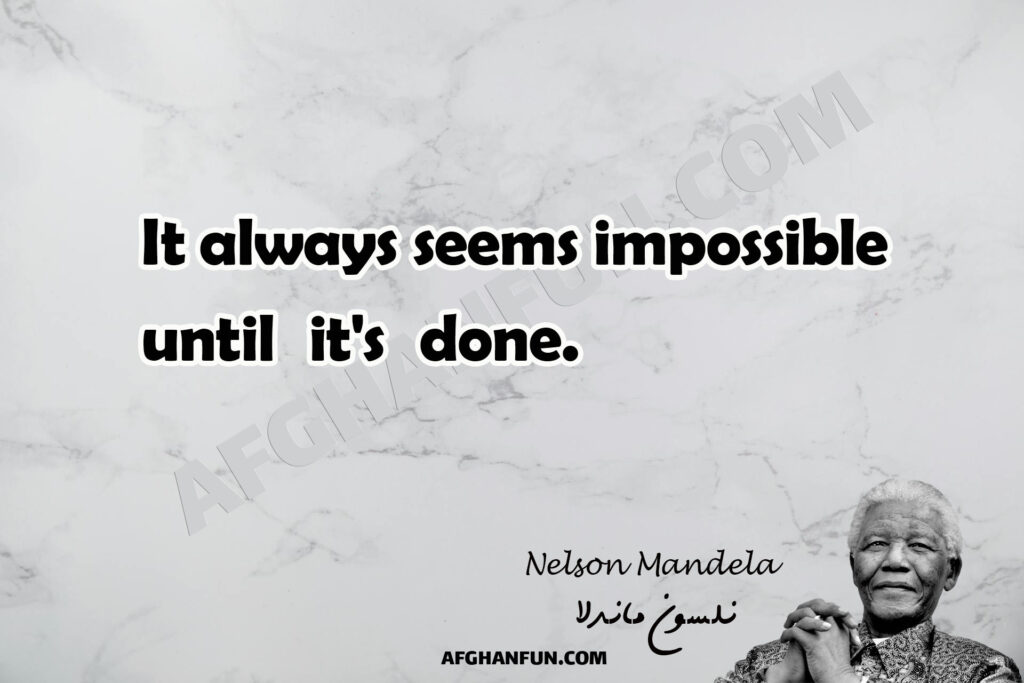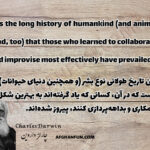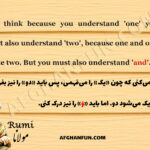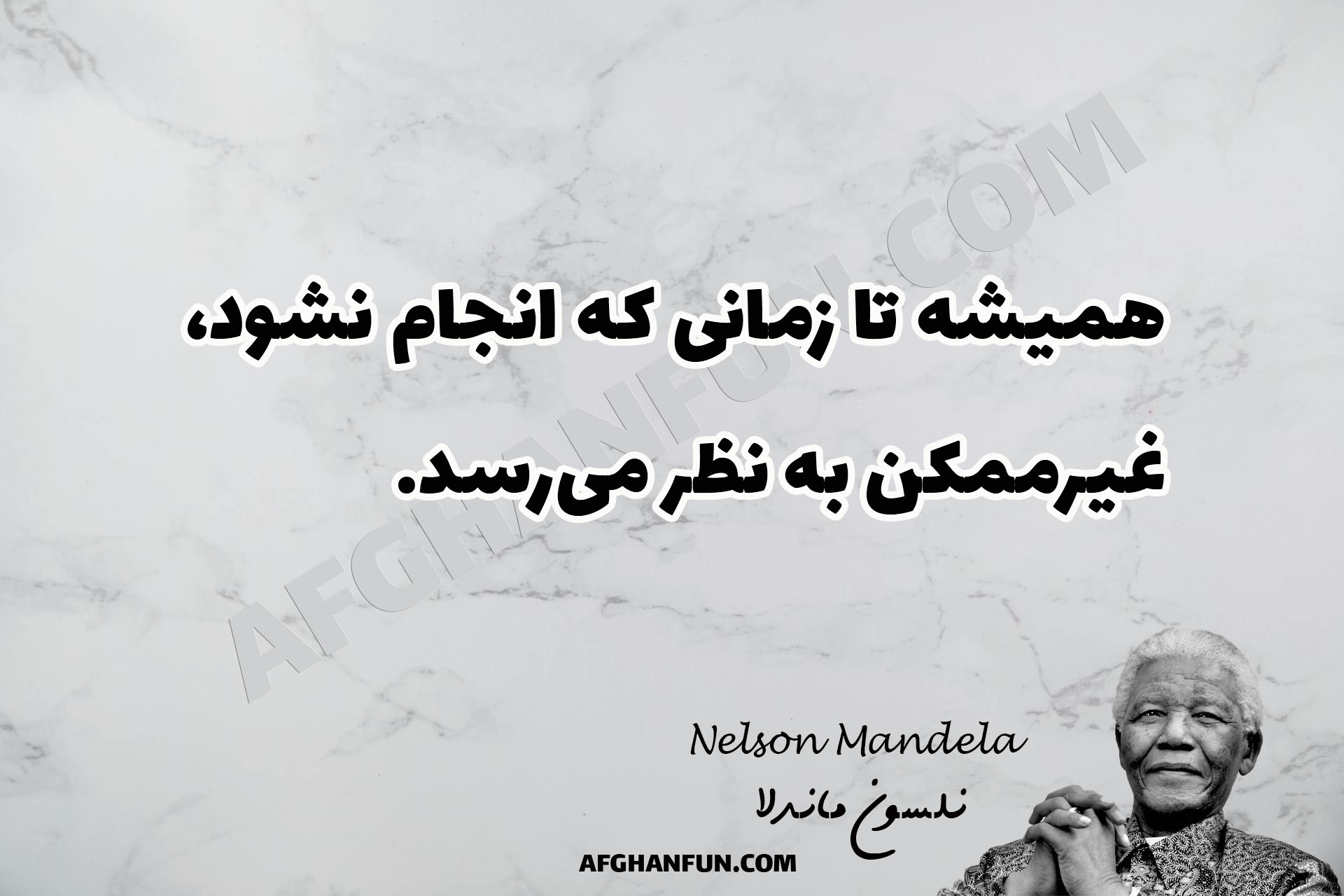
It always seems impossible until it’s done.
Nelson mandela
همیشه تا زمانی که انجام نشود، غیر ممکن به نظر میرسد.
نلسون ماندلا
این جمله بیان میکند که اغلب اوقات، قبل از انجام دادن کاری، آن کار بسیار بزرگ و غیرممکن به نظر میرسد. اما زمانی که شروع به انجام آن میکنیم و گام به گام پیش میرویم، متوجه میشویم که با کمی تلاش و پشتکار، میتوانیم به هر هدفی دست پیدا کنیم. این نقل قول به ما یادآوری میکند که نباید از رویاهای خود دست بکشیم و همیشه به دنبال فرصتهای جدید باشیم.
Ҳамеша то замоне ки иҷро нашавад, ғайри имкон менамояд.
Нелсон Мандела
Ин ибора ба мо мегӯяд, ки аксар вақт, пеш аз анҷом додани як кор, он кор хеле бузург ва ғайриимкон ба назар мерасад. Вале вақте ки мо оғоз ба анҷом додани он мекунем ва қадам ба қадам пеш меравем, мефаҳмем, ки бо каме кӯшиш ва сабр, мо метавонем ба ҳар мақсаде расем. Ин ибора ба мо ёдрас мекунад, ки набояд аз орзуҳои худ даст кашем ва ҳамеша ба ҷустуҷӯи имкониятҳои нав бошем.
دائماً يبدو الأمر مستحيلاً إلى أن يتم انجازه.
نیلسون ماندیلا
يعني هذا القول أن الكثير من الأشياء تبدو صعبة للغاية أو مستحيلة قبل أن نحاول تحقيقها. ولكن عندما نبدأ في العمل ونخطو خطوات صغيرة نحو هدفنا، نكتشف أننا قادرون على تحقيق أي شيء إذا بذلنا الجهد والمثابرة. هذا القول يذكرنا بأهمية عدم الاستسلام لأحلامنا والبحث دائمًا عن فرص جديدة.
Nelson Mandela’s quote, “It always seems impossible until it’s done,” encapsulates the notion that challenges, no matter how daunting they appear at first, can be overcome with perseverance, effort, and determination. Let’s break it down:
1. Perception of Impossibility
“It always seems impossible” speaks to the initial reaction we often have when faced with a difficult task or situation. In the face of adversity, our natural instinct may be to doubt our ability to succeed. The “impossibility” is not a fixed reality, but rather a psychological barrier we perceive before even attempting to tackle the task.
This highlights how fear, uncertainty, and self-doubt can cloud our judgment, making something seem insurmountable even before we try. It’s a human response to challenges, a reflection of our vulnerability when we face the unknown.
2. The Power of Completion
“Until it’s done” reflects the transformative power of action and perseverance. Once the task is completed, the perception of impossibility vanishes. What once seemed insurmountable becomes a tangible achievement. The phrase suggests that the outcome is proof of the potential to succeed, regardless of how difficult the journey seemed at the outset.
This part of the quote reminds us that the fear of failure is often exaggerated; what feels impossible can be accomplished with the right mindset, determination, and hard work.
3. Emphasizing Persistence
The quote underscores a broader theme of persistence and resilience. Whether it’s a personal challenge, a political struggle, or a long-term goal, many of the greatest accomplishments in history were once thought to be impossible—until they were achieved. Mandela himself, who spent 27 years in prison for his fight against apartheid, is a living embodiment of this idea.
The message is not just about completion, but about the process. The hard work, the perseverance, and the belief that, despite the odds, success is possible if we don’t give up.
4. A Call to Action
At a deeper level, Mandela’s quote is also a call to take action. Often, the hardest part of any endeavor is starting. We can spend too much time overthinking the difficulty of a task, rather than just engaging with it. By reminding us that things often “seem” impossible, Mandela encourages us to take that first step, trust in our ability, and push through even when the journey ahead feels overwhelming.
5. The Significance of Context
In Mandela’s life, this quote holds particular weight. His struggle against apartheid in South Africa, the fight for human rights, and the ultimate triumph of democracy in the country were all monumental efforts that once seemed impossible. Yet, through unwavering commitment to justice and equality, Mandela achieved what many had once thought was an unattainable goal. His life is a powerful testament to the truth of his own words.
Conclusion
In summary, this quote is about overcoming doubt and pushing through barriers, understanding that the sense of impossibility is often just a mental hurdle before you achieve success. It’s about resilience, action, and faith in the process, which are all essential ingredients for turning the impossible into the possible.
Nelson Mandela (1918–2013) was a South African anti-apartheid revolutionary, political leader, and philanthropist who served as the president of South Africa from 1994 to 1999. He became the country’s first black head of state and the first elected in a fully representative democratic election. His presidency marked the end of decades of institutionalized racial segregation and the beginning of the nation’s transition to democracy. Mandela is widely celebrated as a global icon for peace, justice, and the fight against oppression.
Here is more information about his life and legacy:
Early Life and Education
- Full Name: Nelson Rolihlahla Mandela
- Birth: July 18, 1918, in the village of Mvezo, in the Eastern Cape province of South Africa.
- Family Background: Mandela was born into the Thembu royal family. His father was a local chief, but he died when Mandela was young, and he was raised by the acting regent, his mother’s family.
- Education: Mandela attended Healdtown (a Methodist school) and later studied at the University of Fort Hare and the University of Witwatersrand. He qualified as a lawyer in 1942, working with Oliver Tambo to establish one of the first black law firms in South Africa.
Political Activism and the Anti-Apartheid Movement
- African National Congress (ANC): Mandela became involved in politics in the 1940s, joining the ANC in 1944. He was influenced by the anti-colonial and anti-racist movements of the time.
- Defiance Campaign: In 1944, he helped launch the ANC Youth League, which advocated for mass resistance against apartheid laws. Mandela became an advocate for non-violent protest, but his views evolved over time as the apartheid system grew more oppressive.
- Rivonia Trial and Imprisonment: In 1962, Mandela was arrested for organizing strikes and sabotage against the apartheid regime. In 1964, he was sentenced to life imprisonment for plotting to overthrow the government during the Rivonia Trial. He was imprisoned for 27 years, mostly at the Robben Island prison.
- During his imprisonment, Mandela became a symbol of the struggle for racial equality, and international campaigns for his release gained momentum. His steadfast commitment to justice and equality inspired people across the globe.
Release from Prison and Presidency
- Release: Mandela was released from prison on February 11, 1990, amid growing internal resistance to apartheid and mounting international pressure on the South African government.
- Negotiations for Peace: After his release, Mandela worked with then-President F.W. de Klerk to negotiate the dismantling of apartheid and transition to a multiracial democracy. The process culminated in the 1994 elections, in which Mandela’s ANC won a landslide victory.
- Presidency (1994-1999): In 1994, Mandela became the first black president of South Africa. His presidency was focused on reconciliation and nation-building, aiming to heal the wounds of apartheid while addressing poverty, inequality, and human rights abuses. He emphasized Ubuntu (the philosophy of shared humanity and interconnectedness) as a guiding principle for a united South Africa.
Post-Presidency and Global Influence
- Retirement from Politics: After serving one term as president, Mandela stepped down in 1999. He continued his activism, especially in the fight against HIV/AIDS, which had a devastating impact on South Africa.
- Global Ambassador for Peace: After his presidency, Mandela worked on various humanitarian causes. He became a global advocate for peace, conflict resolution, and human rights, while continuing his efforts to address issues such as poverty and education.
- Nelson Mandela Foundation: Founded in 1999, the Nelson Mandela Foundation focuses on promoting his legacy of equality, justice, and social change, and it works to address critical social issues in South Africa.
Personal Life and Legacy
- Marriage: Mandela was married three times. His first wife, Evelyn Ntoko Mase, was a nurse, and they had four children. His second wife, Winnie Madikizela-Mandela, was a prominent anti-apartheid activist who faced great personal and political challenges. They separated after 38 years of marriage. His third wife, Graça Machel, was the former first lady of Mozambique.
- Health and Death: Mandela faced numerous health challenges later in life, including a long battle with respiratory infections. He passed away on December 5, 2013, at the age of 95, surrounded by family at his home in Johannesburg.
Mandela’s death was met with an outpouring of tributes from around the world, and his legacy as a leader of peace, justice, and reconciliation is celebrated globally. He was awarded the Nobel Peace Prize in 1993 (shared with F.W. de Klerk) for his efforts to dismantle apartheid and build a democratic South Africa.
Key Contributions and Legacy
- Apartheid Resistance: Mandela is best known for his role in fighting apartheid, an institutionalized system of racial segregation and discrimination in South Africa.
- Peace and Reconciliation: As president, Mandela’s efforts at national reconciliation—through policies like the Truth and Reconciliation Commission—helped prevent civil war and foster national healing.
- International Icon: He is regarded as a global icon for freedom, equality, and social justice. His story has inspired movements for civil rights, equality, and human dignity worldwide.
- Awards: Besides the Nobel Peace Prize, Mandela received numerous awards and honors, including honorary degrees, the Bailie Gifford Prize, and the Presidential Medal of Freedom in the United States.
Famous Quotes by Mandela:
- “Education is the most powerful weapon which you can use to change the world.”
- “I have walked that long road to freedom. I have tried not to falter; I have made missteps along the way. But I have discovered the secret that after climbing a great hill, one only finds that there are many more hills to climb.”
- “It always seems impossible until it’s done.”
Conclusion:
Nelson Mandela’s life was a journey of extraordinary personal sacrifice, resilience, and vision. He spent much of his life fighting against injustice and the oppressive system of apartheid, and his legacy is a testament to the power of forgiveness, reconciliation, and the belief that change is possible, no matter how entrenched the systems of oppression may seem. His life and teachings continue to inspire people around the world to work for justice, equality, and peace.











